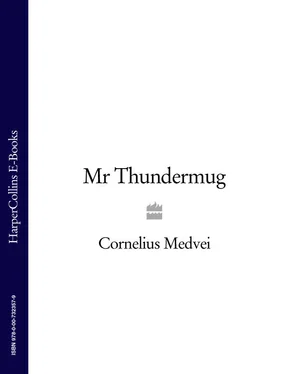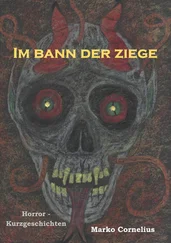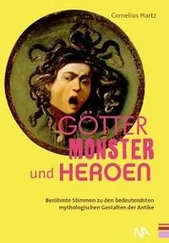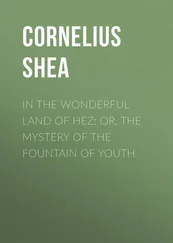MR
THUNDERMUG
CORNELIUS MEDVEI

Epigraph ‘I could never look long upon a monkey, without very mortifying reflections.’ William Congreve
Chapter 1
Chapter 2
Chapter 3
Chapter 4
Chapter 5
Chapter 6
Chapter 7
Chapter 8
Chapter 9
Chapter 10
Chapter 11
Chapter 12
Chapter 13
Chapter 14
Chapter 15
Chapter 16
Acknowledgements
Copyright
About the Publisher
‘I could never look long upon a monkey,
without very mortifying reflections.’
William Congreve
ONE RAINY NIGHT not long ago, a curious report appeared in the late edition of our city's evening newspaper. Under the headline ‘MONKEY PROFESSOR DIES’, it was the obituary notice for an academic, one Dr Alphonsus Rotz. The article went like this:
DR ALPHONSUS ROTZ, who has died at the age of 60, was one of the most original zoologists of recent years. He will be best remembered for his fieldwork with primates.
After taking a degree in zoology, followed by a Ph.D. on ‘Posterior Pigmentation in the Mandrill’, Alphonsus Rotz was appointed Extraordinary Research Fellow at the National University, allowing him a generous stipend that provided the basis for a series of audacious research projects.
Probably the most famous of these projects was his 19-year period of unorthodox and, at times, controversial field research on the silver-maned baboons of the Ethiopian savannah. He went there with a party of graduate students, which he was supervising on a summer project. At the end of the summer his students returned home, but Rotz decided to stay. Left alone, he extended the theory of total immersion fieldwork, already practised widely by forward-thinking anthropologists. He became part of the baboon colony, living in a cave in the rocks, sharing their diet of roots and insects and taking part in their courtship rituals. Years later, Dr Rotz recalled in an interview how he had gained the creatures' trust so completely that baboon mothers would give him their offspring to suckle when they went out hunting.
But Dr Rotz's uncompromising approach to field-work had its drawbacks. Cut off as he was, the project leaders heard from him less and less frequently, and eventually Rotz lost all contact with the academic establishment. Assuming he was dead, the university stopped paying his stipend.
However, Dr Rotz was not dead, and he had even been contributing sporadically to a journal published in Addis Ababa. The back numbers of this publication give an idea of the work he was engaged in among the baboons. At first he was interested in routine questions, such as the animals' diet and etiquette, and the significance of the baboon in local folklore. Later articles contained outlines for a theory on the origin of language, and a detailed study of baboon vocal cords.
After nineteen years Dr Rotz left the savannah abruptly and returned home, to the astonishment and delight of his colleagues. He was unkempt and incoherent, and he brought with him only a small package containing his journals and a few mementos – a lock of pungent-smelling hair and a greasy photograph of a baboon baring its teeth. It was never fully explained why he had chosen, after all this time, to break off his research and come home. All Dr Rotz would say was that he had left for ‘personal reasons’.
Only at this point in the article did Dr Rotz's – admittedly tenuous – connection with our city become clear. When he returned from Africa, his former colleagues were naturally pleased to see that he was still alive, but having once stopped his stipend the university authorities were reluctant to start paying it again, and so Dr Rotz left to take up the position of visiting professor of zoology at the Central University of our city. The obituary continued:
DURING THIS TIME he published a series of papers which synthesized his findings and his theories from his work among the baboons. One of these papers gained particular notoriety in academic circles. In it he described how he had run a kind of hedge school for baboons with the purpose of identifying the most intelligent animals at an early age. He had worked with one unusually gifted female over a period of several years and eventually succeeded – so he claimed – in teaching the animal to speak. The appendix to this paper contained a lyrical account, quite unsuitable for an academic essay, of their long discussions of German Romantic poetry, sitting on a rocky outcrop in the moonlight, overlooking the boundless savannah.
After some deliberation the university authorities agreed to publish this paper, but in the storm of controversy that followed its appearance, they must have regretted their decision. When Dr Rotz proposed a further article entitled ‘Some thoughts on Homo-baboonus’, which was to consider the possibility of cross-breeding between humans and baboons, they turned him down without hesitation.
Dr Rotz had his new paper published privately, but after this it was almost impossible for him to find another job in a university. When his visiting professorship came to an end he returned to his home town, where he worked in a primary school. He taught arithmetic, geography and, when no other teachers were looking, Customs of the Great Apes. This made him very popular with the children. His standing rose within the school, and eventually he married the headmistress.
The obvious happiness which this marriage brought him, and his fruitful association with the Primate Society, made the last years of his life a period of quiet productivity. It was during this period that he invented the pongoid exfoliator, a device for removing unwanted skin from the feet of gorillas and chimpanzees.
At the time of his death, Dr Rotz was on an expedition in Brazil, sponsored by the Primate Society. He was leading a team of researchers investigating one of the largest macaque colonies of the Orinoco when he went missing early last week. The exact circumstances of his death are still unclear, as his body has not been recovered. However, remnants of clothing found in the spot where he disappeared indicate that he was probably eaten by a jaguar.
He is survived by his headmistress; there were no children.
Few people stop to buy the evening paper on a rainy night, and few of them read as far as the obituaries, which appear on the same page as the standing apology for errors and the chess problem, so the number of people in our city who learnt of Dr Alphonsus Rotz's passing was probably very small. I myself know about the obituary only because I was working on the Evening News at the time. The editor made a point of showing it to me, because he had the idea that I had once studied at the Central University myself.
As I read the obituary, an absurd picture came to me of Dr Rotz chalking up irregular verbs on a rock-face while a troop of baboons clustered attentively round his feet. The obvious conclusion was that Dr Rotz was an eccentric who had been turned by nineteen years of isolation and the rigours of an unfamiliar climate into an out-and-out fantasist. And yet the singlemindedness with which he pursued his academic interests was somehow at odds with this thesis – not to mention his mysterious disappearance among the macaques of the Orinoco, which seemed such a fitting conclusion to a singular life.
I made some enquiries at the Central University, but the few academics who admitted to having known Dr Rotz seemed incapable of agreeing on the most basic details about him. One elderly professor remembered him having a long white beard, while another showed me a photograph of Dr Rotz at a departmental dinner, dark-haired and clean-shaven. There appeared to be no point in investigating the matter further; in any case, I had other assignments to deal with. The obituary was published and forgotten, and I put the whole thing out of my mind.
Читать дальше













